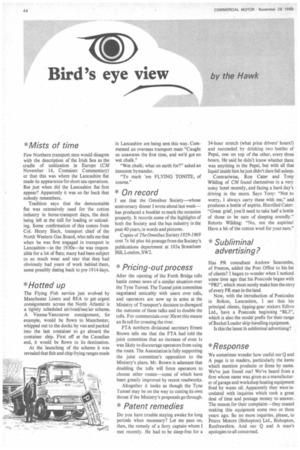Bird's eye view
Page 48

If you've noticed an error in this article please click here to report it so we can fix it.
*Mists of time
Few Northern transport men would disagree with the description of the Irish Sea as the cradle of unitization in Europe (CM November 14, Container Commentary) or that this was where the Lancashire flat made its appearance for short sea operations. But just when did the Lancashire flat first appear? Apparently it was so far back that nobody remembers.
Tradition says that the demountable flat was extensively used for the cotton industry in horse-transport days, the deck being left at the mill for loading or unloading. Some confirmation of this comes from Col. Henry Slack, transport chief of the North Western Gas Board, who tells me that when he was first engaged in transport in Lancashire—in the 1930s—he was responsible for a lot of flats; many had been subject to so much wear and tear that they had obviously had years of work behind them, some possibly dating back to pre-1914 days.
*Hotted up
The Flying Fish service just evolved by Manchester Liners and BEA to get urgent consignments across the North Atlantic is a tightly scheduled air/road/sea/air scheme. A Vienna-Vancouver consignment, for example, would be flown to Manchester, whipped out to the docks by van and packed into the last container to go aboard the container ship. First off at the Canadian end, it would be flown to its destination.
At the launching of the scheme it was revealed that fish and chip frying ranges made in Lancashire are being sent this way. Commented an overseas transport man: "Caught us unawares the first time, and we'd got no wet chalk."
"Wet chalk; what on earth for?" asked an innocent bystander.
"To mark 'em FLYING TONITE, of course."
* On record
I see that the Omnibus Society—whose anniversary dinner I wrote about last week— has produced a booklet to mark the occasion properly. It records some of the highlights of both the Society and the bus industry in the past 40 years, in words and pictures.
Copies of The Omnibus Society 1929-1969 cost 7s 6d plus 6d postage from the Society's publications department at 103a Streatham Hill, London, SW2.
* Pricing-out process
After the opening of the Forth Bridge tolls battle comes news of a similar situation over the Tyne Tunnel. The Tunnel joint committee negotiated amicably with users over tolls, and operators are now up in arms at the Ministry of Transport's decision to disregard the outcome of these talks and to double the tolls. For commercials over 30cwt this means an Ss toll for crossing the river.
FTA northern divisional secretary Ernest Brown tells me that the FTA had told the joint committee that an increase of even ls was likely to discourage operators from using the route. The Association is fully supporting the joint committee's opposition to the Ministry's plans. Mr. Brown is adamant that doubling the tolls will force operators to choose other routes—some of which have been greatly improved by recent roadworks.
Altogether it looks as though the Tyne Tunnel may be on the way to cutting its own throat if the Ministry's proposals go through.
* Patent remedies
Do you have trouble staying awake for long periods when necessary? Let me pass on, then, the remedy of a ferry captain whom I met recently. He had to be sleep-free for a 34-hour stretch (what price drivers' hours!) and succeeded by drinking two bottles of Pepsi, one on top of the other, every three hours. He said he didn't know whether there was anything in the Pepsi, but with all that liquid inside him he just didn't dare fall asleep.
Contrariwise, Ron Cater and Tony Wilding of CM found themselves in a very noisy hotel recently, and facing a hard day's driving in the morn. Says Tony: "Not to worry, I always carry these with me," and produces a bottle of aspirin. Horrified Cater: "Great grief, you'd need to take half a bottle of those to be sure of sleeping soundly." Retorts Wilding: "No, not the aspirins! Have a bit of the cotton wool for your ears."
* Subliminal advertising?
Has PR consultant Andrew Seacombe, of Preston, added the Post Office to his list of clients? I began to wonder when I noticed some time ago that his Postcode began with "PRI", which must surely make him the envy of every PR man in the land.
Now, with the introduction of Postcodes in Bolton, Lancashire, I see that his principal clients, tipping-gear makers Edbro Ltd., have a Postcode beginning "BL3", which is also the model prefix for their range of Bucket Loader skip-handling equipment.
Is this the latest in subliminal advertising?
* Response
We sometimes wonder how useful our Q and A page is to readers, particularly the items which mention products or firms by name. We've just found out! We've heard from a firm whose name was given as a manufacturer of garage and workshop heating equipment fired by waste oil. Apparently they were inundated with inquiries which took a great deal of time and postage money to answer. The reason for their complaint—they ceased making this equipment some two or three years ago. So no more inquiries, please, to Peters Motors (Bishopton) Ltd., Bishoptort, Renfrewshire. And our Q and A man's apologies to all concerned.
















































































































